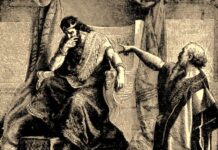This is my Journey. This is my Testimony. This is how I found Freedom from the institutions in Christ Alone.
Though Martin Luther is commonly credited with leading the “Protestant Reformation”, men like John Wycliffe (1331-1384), and Jan Hus (1369-1415), were mounting serious and meaningful challenges to the authority and practices of the Catholic church over 100 years before Luther’s Ninety-Five Theses was nailed to the church door. These men, and other reformers like them, could not find a biblical justification for what they saw “the church” doing, and they literally risked their lives and livelihoods to question it.
At the heart of their protests was the way “the church” had inserted itself as the middle-man (or broker) between God and His people; and the rampant corruption that resulted from it. In that era, “Christians” had to rely on “the church” to teach them what the scripture said, to forgive their sins, and to administer the sacraments, which were ostensibly their connection to God, and ultimately to salvation. A failure to live up to the standards of “the church” could get you cut off from the sacraments, which in that context amounted to being cut off from God.
My journey begins in the Catholic Church. As a person who was raised in a devoutly Catholic family, this is similar to the understanding of God I grew up with. He was too high, and too holy, to be approached by people like me; and so we prayed to the saints, and we prayed to Mary, and we relied on the priests, and the bishops, and the Pope to tell us what God really wanted from us. He was so holy that we had to whisper in the sanctuary, even when there wasn’t a service going on.
In those days, I believed that the church building was God’s house, and that this was where I needed to go to be with Him. Of course, the idea of being with Him was scary, because, as I was frequently reminded, He would one day judge me and decide whether I was worthy of heaven. No doubt, fear of the Lord is the beginning of wisdom, but I don’t think that this is what God had in mind. I emerged from this upbringing with an awe of God, and gratitude for the sacrifice that Jesus made for me, but with no real connection to either of them, and no understanding of the “Holy Ghost”. From my perspective, God was a world away (i.e. in heaven), Jesus had died 2000 years ago, and here I was, on my own.
When I left home, I left “the church” behind; not out of hurt, or anger, or some great theological issue, but rather because it seemed irrelevant to my life. Though I always tried to be a “good” and moral person, I simply adapted to my surroundings, and the culture; and for a lot of years that seemed to be OK. But, eventually, I became aware of a nagging emptiness within me, and as I sought to find its origin, I discovered that God was what was missing from my life. This wasn’t happy news for me, because I assumed that it meant going back to church, and I hadn’t really missed that part. But since church was all that I knew, that’s what I did.
Though my first attempt was a Catholic church, a “protestant” friend eventually invited me to their church, and I soon found my journey taking me in a different direction. Bible studies began to challenge what I thought I knew, and when I finally read the Bible for myself, I emerged with a totally different picture of God, what He wanted, and what it meant to be His son. I realized that He wanted to have a personal relationship with me, and though I wasn’t really sure how to go about that, I was committed to the pursuit of it.
Though it took some time, I gradually began to experience a tangible awareness of His presence, and to discern His voice. At times, I encountered His Holy Spirit in powerful ways, and I was forever transformed in those moments. The revelation that His Spirit lives inside of me brought God out of heaven, and Jesus out of history, and placed them in the center of my everyday. It changed my life in every way, and has become my sole source of hope.
I guess that this testimony of my journey would seem to support the idea that the “Protestant” flavor of Christianity is somehow superior to the “Catholic’ brand, but after twenty years of travelling within these circles, the two have begun to look incredibly similar. Though I am grateful to my Evangelical friends, and their urging to come kneel at the altar; and to my Baptist friends, and their encouragement to read the Bible; and for my Charismatic brothers and sisters, and their love of all things spiritual. And while I did feel the need to get baptized again; and while I have been known to speak in tongues; and while I do continue to find my way to a church pew on most Sundays, none of it has, or ever will, save my soul.
All of it has only been worthwhile to the degree that it helped me to find Jesus Christ, and to become genuinely connected to Him, and to fulfill His purposes for my life. Though God used (and uses) these things (i.e. both my Catholic upbringing & my experiences within “Protestant” circles), it was Him who drew me to Himself, it was Him who spoke to my heart, it was Him who gave me (and gives me) new life. Ultimately, this entire journey has been (and is) a transaction between Him and me. He is the Vine and I am a branch; I am sustained by Him.
It seems to me that throughout human history God has tried to orchestrate a direct connection with His children, and that men have consistently resisted that effort. It began in the garden, where all He wanted was to walk with them in the cool of the day; but Adam and Eve chose a different path.
In Moses’ day, He spoke to the people on their journey to the Promised Land from the mountain; but it frightened them, and they asked Him to stop. Later, when the people cried out for a king, He lamented, “I wanted to be their King”. And when He sent them prophets to speak for Him, they ignored and/or killed them.
But finally, through the perfect sacrifice of Jesus, He was able to send His Spirit to dwell within the hearts of those who are truly His. This was (and is) the consummation of God’s desire to have a genuine and intimate relationship with His people. No more need for animal sacrifices, no more need to go to the temple to experience His presence, no more need to find the prophet to hear what God is saying. The veil was torn, and even a “wretch like me” was (and is) now free to come directly to the throne of grace. So where does that leave “the church”?
The church that Jesus spoke of wasn’t an institution, nor was it meant to be contained in a building. He spoke of a body of believers, living in response to Him, through His Spirit. He envisioned a connection that was so intimate that it would be like that of a groom and his bride. A people so devoted to Him, and to each other, that the world couldn’t help but see a compelling picture of His love for them. But what we have arrived at (in this present age) is much more rooted in religious tradition, and pragmatism, than in anything scriptural.
The “church” has become little more than the place where we go to practice our particular brand of religion. And while the exercising of one’s religious convictions is not necessarily a bad or evil thing, there is a spirit that tends to lurk about such activity, continuously trying to twist it’s meaning and context. I would call this a religious spirit, or the spirit of religion, and it is the same spirit that utterly convinced Caiaphas that he was protecting Israel by demanding Jesus’ crucifixion, and Paul that he was doing God’s work by killing Jesus’ followers. If we are not discerning, we too can convince ourselves that all the religious activity in our journey is accomplishing something that it is not. Jesus warned His followers of this in the gospels (Matt 7:23 – Not everyone who says to me Lord, Lord, will enter the kingdom of heaven…)
In fact, nothing seemed to stir Jesus’ ire like a religious spirit, with many of His strongest rebukes pointed at the religious leaders of His day. These men perceived themselves to be God’s agents, and yet Jesus said, “Woe to you, teachers of the law and Pharisees, you hypocrites! You shut the door of the kingdom of heaven in people’s faces. You yourselves do not enter, nor will you let those enter who are trying to (Matt 23:13).”
Obviously, Jesus’ anger was rooted in the fact that these men were standing in the way of people coming directly to Him, and there can be no doubt that He feels the same way today. At its core, the spirit of religion is an anti-Christ spirit, which seeks to re-erect the veil by placing itself between Christ and His people. It exalts its symbols, and its doctrine, and its rituals, and its officials, thereby stealing the focus away from the One who is the source of life. The great reformers of the past came against this spirit in what we would now consider the Catholic church, and I would suggest, that the reformers of today need to do the same for those churches which would be considered “Protestant” in heritage.
Since Luther’s time, the reformed church has gradually restored much of the hierarchy, ritual, and idolatry it purportedly intended to leave behind. The “Christian” culture in America is now littered with superstar personalities, who can fill arenas, and demand grand compensation for their ministry. We now have ministers who carry special titles (e.g. Bishop, Archbishop, Apostle, Prophet..), and are led to believe that they make up some privileged class within the Body of Christ.
In many instances, people exalt these leaders, laying money at their feet, and standing in line so that they can be touched by them. An internet search can locate videos of such ministers literally being crowned, or essentially knighted with a sword. Many such ministries offer special blessings (i.e. indulgences) for those who give a requisite amount. Even in places without that kind of hysteria, people are taught that the church, or their Pastor, is their spiritual covering, and that they will be unprotected if they come out from under their authority. Over and over again, in a thousand different ways, the message becomes that we need what they have to offer in order to reach our God ordained destiny, and that is directly counter to the good news of the gospel.
I am not saying that there are no sincere ministers anymore, or that there aren’t congregations that are doing good work within their communities. Undoubtedly, both still exist. I’m not saying that anyone who holds a special title is corrupt or greedy. I personally know many gifted ministers who can legitimately claim such a title.
But I am saying that in my journey I have found this model that we have adopted for “church” is not producing the kind of fruit Jesus died to provide. Collectively, we are not being the salt and light; we are not known by the way we love each other, we are not being transformed into the image of Christ, and we don’t seem to be having much of an effect on the gates of hell.
Our children are largely emerging from their church upbringings without a genuine connection to God, and are leaving the faith in droves. As I read the scripture, I find that God is being exactly who He said He would be, and that the enemy of our souls is acting exactly like God said he would, and that the world (i.e. mankind) is being exactly like He said it would be, and that creation is responding just like He said it would. The one character that I read about in the Bible, that I don’t see, is the Bride of Christ, who Jesus comes back for.
At this point in my journey, I would guess that our current religious practice isn’t going to get us there. Ultimately, it is Christ in us that is the hope of glory. Until the life of Christ within us becomes our guide, we are bound to wander aimlessly. Unless the Lord builds the house, we will continue to labor in vain.
May the Lord bless you with wisdom on your journey!
Bryan Corbin
This is my story. This is my Journey!









































[…] En Inglés https://godsleader.com/my-journey-out-of-the-different-institutions/ […]